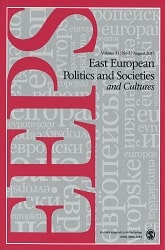The Benefits of Backlash: EU Accession and the Organization of LGBT Activism in Postcommunist Poland and the Czech Republic
The Benefits of Backlash: EU Accession and the Organization of LGBT Activism in Postcommunist Poland and the Czech Republic
Author(s): Conor O’DwyerSubject(s): Gender Studies, Human Rights and Humanitarian Law, Civil Society, Political history, Government/Political systems, Transformation Period (1990 - 2010), Post-Communist Transformation, EU-Approach / EU-Accession / EU-Development, Sociology of Politics
Published by: SAGE Publications Ltd
Keywords: LGBT activism; EU accession; legacies of communism; social movements; norm diffusion;
Summary/Abstract: How can we explain variation in the organization of LGBT activism in postcommunist Europe, both across countries and over time? Much of the extant scholarship has analyzed the comparative politics of homosexuality in the region in terms of transnational norm diffusion occurring within the context of EU accession and integration. Thus, it emphasizes the empowerment of domestic gay rights groups either through maximizing the leverage of their external allies or through increasing their linkage with transnational advocacy networks. This paper argues that the effectiveness of these diffusion mechanisms is strongly constrained by the collective action problems faced by gay rights activists in societies with a legacy of civil society underdevelopment, such as in postcommunist Europe. We argue that hard-right backlash is a critical domestic factor that can help overcome these collective action problems, enabling gay rights activists to find resonant frames, build internal solidarity, and win allies—even when social movement resources are minimal. The research focuses on a close comparison of Poland and the Czech Republic since 1989 and draws on field interviews and original sources to process-trace the resonance of LGBT rights frames and how activism is organized. By building organizationally robust activism, postcommunist gay rights movements lay claim to full membership in the political community, exercise civil rights as LGBT citizens (not merely as private ones), and expand the sphere of “sexual citizenship.”
Journal: East European Politics and Societies
- Issue Year: 32/2018
- Issue No: 04
- Page Range: 892-923
- Page Count: 32
- Language: English
- Content File-PDF

